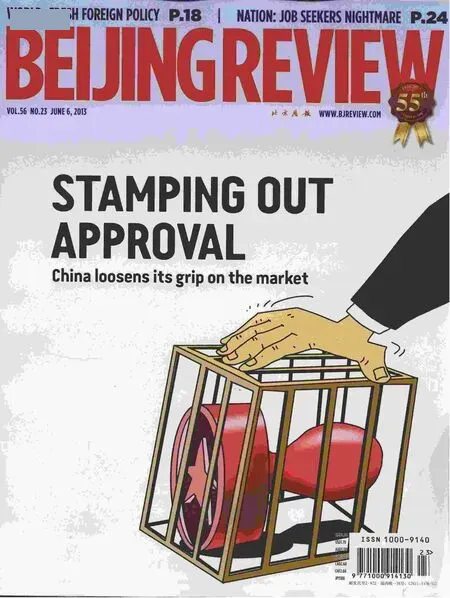party Opens Rulebook
China’s ruling party issues documents to regulate its internal rule-making process By Wang Hairong
“Sound internal regulations are instrumental to the party’s and the country’s destiny.”
—Zhen Xiaoying, a professor at the Central Socialist Academy based in Beijing
The Communist Party of China (CPC)Central Committee released two documents on May 27 to standardize the Party’s internal rule-making process and improve the development of intra-Party regulations.
One regulation specifies the Party organs authorized to draft, approve, publish, amend and abolish Party regulations and the procedures to follow. Another document stipulates how Party regulations should be recorded, reviewed, amended or abolished.
“Stable and standard management of the CPC, the ruling party, is an important aspect of the rule of law in China,” Jiang Ming’an, a law professor at Peking University, told Xinhua News Agency.
The new Party leadership elected at the 18th CPC National Congress last November attaches great importance to tightening up internal management of the Party through standardizing the formation of Party rules, Jiang said.
On a number of occasions, Xi Jinping, General Secretary of the CPC Central Committee, has promised to keep power reined within the cage of regulations.
The cage—the laws and Party regulations—should be strong enough, said Ye Duchu, a professor at the Party School of the CPC Central Committee.
The first document stipulates that Party regulations must be made under the principle that the Party must abide by the Constitution and laws in all its activities.
“Sound internal regulations are instrumental to the Party’s and the country’s destiny,”said Zhen Xiaoying, a professor at the Central Socialist Academy based in Beijing.
Founded in 1921, the CPC currently has 82 million members and 4 million grassroots organs. It is governed by a comprehensive set of regulations.
But experts said that some regulations are not well-targeted and hence not operational,and some old ones have not been updated in a timely fashion.
More transparent and systematic
The two regulations are the first formal documents to regulate the formation of CPC rules. It is based on a temporary regulation on the formation of Party rules issued in 1990.
Compared with the temporary regulation,the new regulations make the rule-making process more transparent and systematic.
Article 19 of the first document stipulates that, after a Party regulation is drafted, the CPC should solicit opinions from Party members and relevant experts. On matters closely related to the public’s immediate interests, the CPC should seek feedback from the public. Feedback can be collected in written form, online or through consultation meetings.
The article will prevent formalism and bureaucracy in the rule-making process as well as prevent the Party from being alienated from the general public or divorced from reality, Zhen said.
According to the new regulatory protocol,new rules should generally be published after approval, which is a departure from the Party’s previous stipulation that only required certain Party regulations to be released to the public.
“The basic nature of rule is openness and transparency. Those not open and transparent cannot be called rules,” said Jiang. He added that increased awareness of Party regulations can facilitate their implementation and public oversight.
The CPC now requires, for the first time in its history, the development of annual and five-year plans on drafting and amending internal rules.
A relatively long-term plan will help the Party to make better and more consistent rules,said Zhen.
In addition, the new documents also stipulate that Party regulations should be properly recorded, sorted out and evaluated by authorized Party organs.
Party regulations should be recorded with the CPC Central Committee within 30 days from their promulgation. Regulations contradictory to the Constitution and system of laws should be amended or annulled, as well as those that run counter to the CPC Charter or regulations enacted by central Party organs.
In June 2012, the CPC began comprehensive review of all regulatory documents issued since the founding of the People’s Republic of China in 1949, in order to decide which should be abolished.
According to Xinhua News Agency, this is the first time that Party regulations have been sorted and checked for consistency and validity. ■

